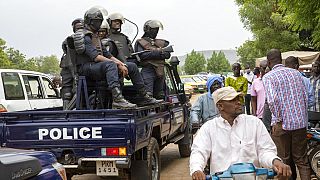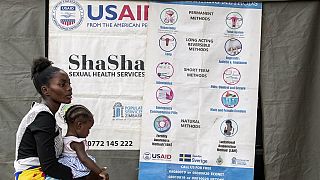Zimbabwe
Zimbabwe’s president Robert Mugabe has made pleas to the U.N. to lift sanctions ‘imposed by western powers’on Zimbabwe, saying that his country is being collectively punished for exercising ‘the right to sovereign independence’.
Mugabe was speaking during his address at the annual opening debate of the United Nations General Assembly.
“As a country, we are being collectively punished for exercising the one primordial principle enshrined in the United Nations charter, that of sovereign independence. We are being punished for doing what all other nations have done and do, that is possess, own their natural resources and listen to the basic interest of their people,” he said.
“I repeat my call to Britain, Europe and the United States and their allies to remove the illegal and unjustified sanctions against my country and its people. Let us all be bound by our commitments to Agenda 2030 in which we agreed to eschew sanctions in favor of dialogue.” Mugabe told delegates.
At the same time, a group Zimbabweans living in the U.S staged a protest outside of the United Nations calling on Mugabe to step down, as others in his support held placards reading “Mugabe is right!”
“Everything is wrong in the country, police brutality, corruption, no food, no education system,” said Tanya Nyathi. “Everything is just in shambles. They’re stealing money, they’ve been doing all corrupt things, there is nothing that is functioning in a country that’s meant to be functioning. There is no water, there is no electricity, there is no medication in hospitals, everything is just messed up. We can’t take that and we’ve seen that for a long time and a lot of people have agreed with it, but this time around, we are saying no to that.”
The United Nation’s 193 member countries last year adopted 17 Sustainable Development Goals (SDGs) as a roadmap to end poverty and hunger, fight inequality and conquer climate change by 2030, often referred to as Agenda 2030.
Mugabe also called for a two-state solution in the Middle East based on pre-June 1967 borders, saying that “this is the only way to achieve peace in the Middle East.”
Since January 2009 Zimbabwe has used foreign currencies including the U.S. dollar, British pound and Chinese yuan after dumping its own currency that had come to symbolize a decade of economic collapse.












11:05
Africa's hight cost of climate change [Business Africa]
01:10
Spain’s left-wing government stands out on migration policy in the EU
01:11
Climate crisis takes centre stage at G20 summit in Brazil
01:17
COP29 finance talks lag as the summit reaches its halfway mark
01:38
COP29: What next for Africa's energy transition?
01:00
Civil society takes center stage at Brazil’s G20 social summit